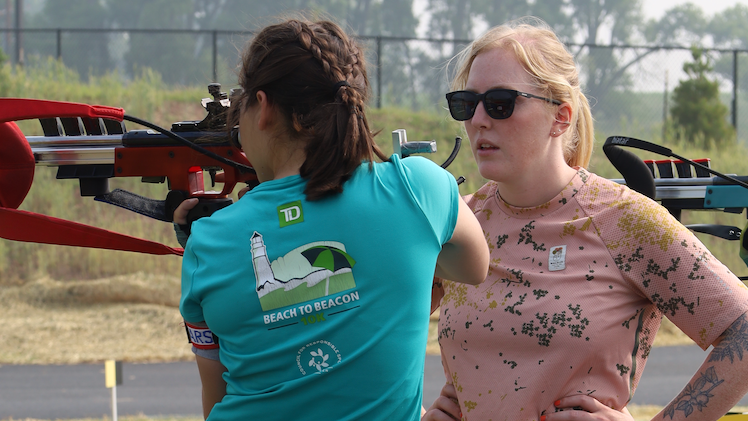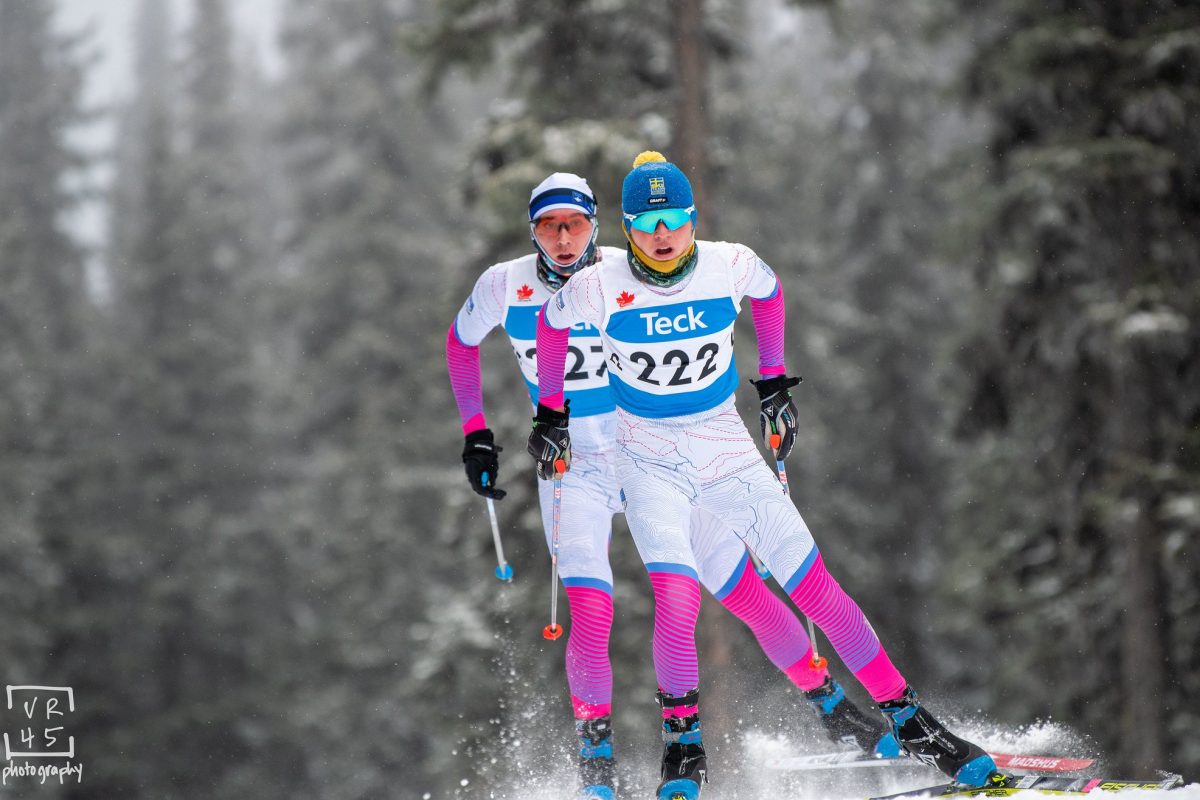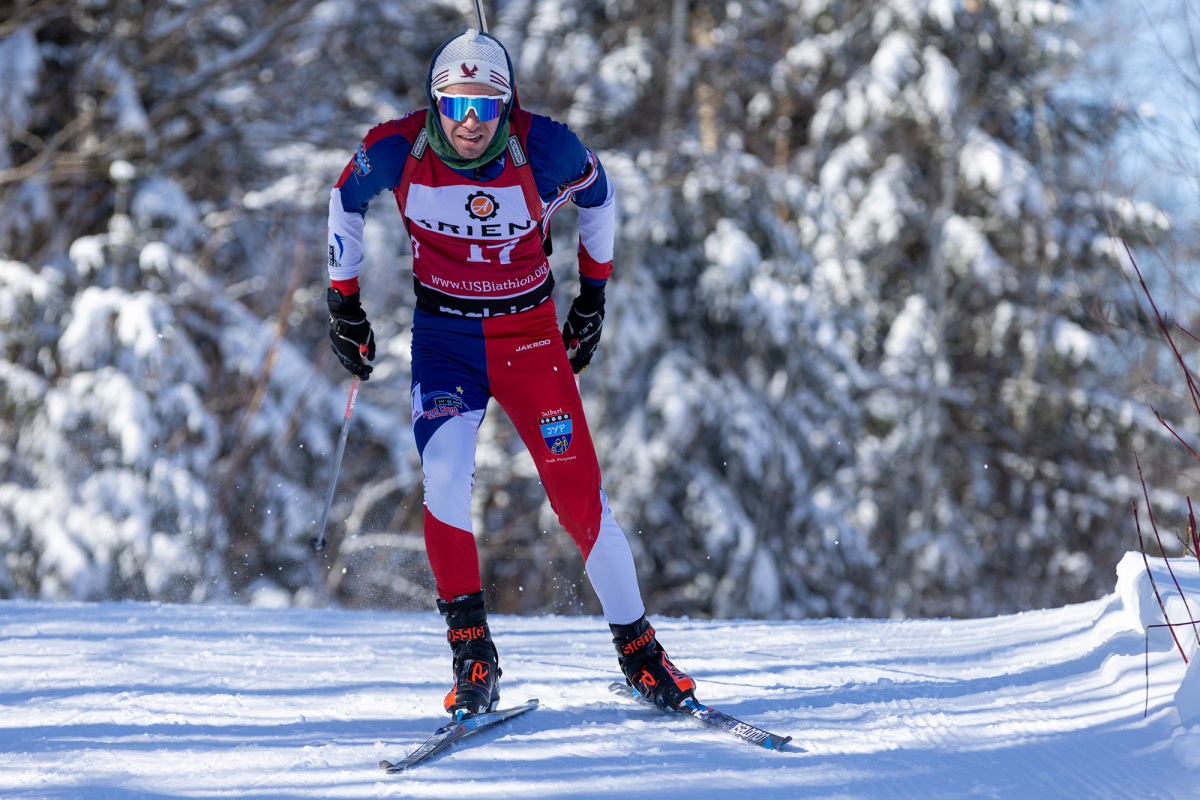
RUHPOLDING, Germany – Canada’s Zina Kocher had a lot to think about during today’s 7.5 k sprint.
But this her tenth World Championships, and Kocher says she’s learned a few things along the way. Today, she didn’t let all of the worries and problems get to her head. Instead, she stuck to business and finished 18th.

“This is probably the most calm I’ve felt in a long time for a World Championship, so that’s crucial for sure,” she said in an interview at the finish line.
What were some of the things that might have been distracting her?
Perhaps the disastrous shooting stage in Thursday’s mixed relay, after which she was incredibly disappointed and felt she had let her team down.
Or maybe she could have worried about her brother, who on Wednesday underwent open heart surgery for the eighth time due to a congenital heart defect. For all the other surgeries, Kocher has been in Canada, ready to stay by his side at the hospital. But not this time around.
“I tried not to be distracted for the relay,” she said after shedding a tear or two at the finish: “I had a decent race and put it behind me for about 20 minutes.”
If neither of those topics were enough of a burden, Kocher is also saddled with the responsibility of collecting a top-16 finish in order to regain funding from Athletics Canada; this season, for the first time in years, she hasn’t had that monthly stipend.
“I definitely really need a top 16,” Kocher said. “It’s been really difficult – last year I really struggled with that, and totally blew up. This year I think that with my training camp in Kontiolahti, I stopped and just focused only on the process, and that has helped. Maybe just with maturity, I don’t know, slowly it’s starting to click.”
Kocher spent 22 minutes and 55 seconds, to be exact, not thinking about any of those things. And it paid off. She missed two shots, which isn’t excellent, but it’s such a vast improvement from the mixed relay that it gave her something to celebrate.
“One-one isn’t great, but it’s way better than the rest of my year, so I’m definitely feeling more confident,” she said.
Kocher felt slow on the first loop, and she wasn’t far from the mark: her ski times improved from being ranked 26th in the opening 2.5 k, to 13th in the middle, and finally she laid down the sixth-fastest closing loop.
“I didn’t want to die on the last lap, it actually was really good,” she said.
Another bonus of Kocher’s performance? It might not be top-16, but it sets her up to achieve that much-needed result in the pursuit. She was just three seconds out of 16th today, and 30 from the top ten.
“I think I’ll have a really good chance,” Kocher said.
Four North Americans Sneak In to Pursuit; Three Don’t

Behind Kocher, the rest of the North Americans didn’t have such positive experiences on the Ruhpolding trails. The dropoff to the next result was large, with U.S. biathlete Sara Studebaker tying for 49th.
Like Kocher, Studebaker had something to prove after an unsettlingly shaky relay performance. And while she didn’t have a result for the ages, the sprint was certainly a step up, because she had only two penalties.
“It’s – fine,” Studebaker said. “I feel like my race today was – fine. A bit of an improvement over the relay, but I feel like in general this season skiing has been a little bit frustrating for me, and for me right now one and one is just a couple too many penalties to get a good result.”
She was trailed by a trio of three more North Americans who snuck in to qualify for the pursuit. Canadians Megan Imrie and Megan Heinicke finished 51st and 52nd, separated by 0.2 seconds, and American Susan Dunklee placed 55th.
Neither Canadian was particularly enthusiastic about her result, although they both said they had fun with the atmosphere here in Ruhpolding.
“My skiing felt really good today, but I had more misses than I planned to,” Imrie told FasterSkier at the finish line. “In prone I wasn’t sure, they felt perfect. I was disappointed with that but everything else went pretty well. I enjoyed it.”
Heinicke said that her race was “not so hot, to be honest.”

Imrie was the only one of the remaining women who started with Kocher in the first draw group. And she actually got to hitch a ride with her teammate, because Kocher was lapping when Imrie started.
“That was good,” she said. “It’s always nice to sort of use each other a little bit. You just feel more comfortable.”
Studebaker and teammate Lanny Barnes started in the third draw group. While starting with the fastest skiers is usually seen as beneficial, Studebaker said that starting a bit further back had been very helpful.
“It was actually pretty fun out there because a lot of the good girls had started earlier, and so unlike some of my other starts which have been early and with that group, there was a lot of people who I was passing,” Studebaker said. “That is definitely a boost – like, ‘oh, I’m going to go after that person,’ and you can actually catch them instead of them being Magdalena Neuner and you think, ‘oh, shoot, there they go.’”
Barnes finished 67th, and said she couldn’t find her speed; she had been living and racing at altitude since December, and only had five days to acclimate to the lower elevation.

Heinicke, Dunklee, Annelies Cook, and Yolaine Oddou all started in the last draw group, based on a decision made by coaches that the snow would speed up as the sun dropped behind the mountains. That may have been true, they all admitted, but they almost universally wished they’d had better competition to ski with.
“Starting at the back, I passed some people, but honestly I was the fastest person that I skied with,” Heinicke said. “It’s always good for someone like me who is not in the top twenty ski times to have faster people around, so you can say, come on, follow her. From a mental side, I would prefer not starting in the back, having some faster skiers around, not have such a long pause, but the bottom line is, you’ve got to be able to execute your warmup and your race regardless of your start number.”
Dunklee agreed.
“When I first saw the start list last night, before I saw the reasoning for why we’d started later, I was just really bummed because all the names of the people I like to ski around were going to be done half an hour before I even started,” Dunklee said. “But then I realized it was an opportunity to ski my own race, and try to do my own thing, so that’s what I did.”
The three listed some unintended benefits of the late start, however. Among them: fewer people on the course for the last loops, making it easier to pick the best, most efficient lines, and also a lack of spectators, which Dunklee said removed some pressure.
Dunklee had four penalties, three of which came in prone.
“I have no idea what happened,” she said of the errors. “I was definitely hoping for a lot better.”
Teammate Cook finished 62nd, and Canada’s Yolaine Oddou 104th.



